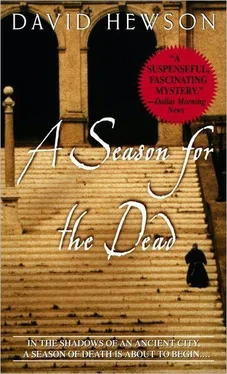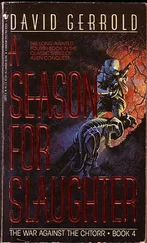David Hewson - A Season for the Dead
Здесь есть возможность читать онлайн «David Hewson - A Season for the Dead» весь текст электронной книги совершенно бесплатно (целиком полную версию без сокращений). В некоторых случаях можно слушать аудио, скачать через торрент в формате fb2 и присутствует краткое содержание. Жанр: Старинная литература, на английском языке. Описание произведения, (предисловие) а так же отзывы посетителей доступны на портале библиотеки ЛибКат.
- Название:A Season for the Dead
- Автор:
- Жанр:
- Год:неизвестен
- ISBN:нет данных
- Рейтинг книги:3 / 5. Голосов: 1
-
Избранное:Добавить в избранное
- Отзывы:
-
Ваша оценка:
- 60
- 1
- 2
- 3
- 4
- 5
A Season for the Dead: краткое содержание, описание и аннотация
Предлагаем к чтению аннотацию, описание, краткое содержание или предисловие (зависит от того, что написал сам автор книги «A Season for the Dead»). Если вы не нашли необходимую информацию о книге — напишите в комментариях, мы постараемся отыскать её.
A Season for the Dead — читать онлайн бесплатно полную книгу (весь текст) целиком
Ниже представлен текст книги, разбитый по страницам. Система сохранения места последней прочитанной страницы, позволяет с удобством читать онлайн бесплатно книгу «A Season for the Dead», без необходимости каждый раз заново искать на чём Вы остановились. Поставьте закладку, и сможете в любой момент перейти на страницу, на которой закончили чтение.
Интервал:
Закладка:
He took her hands, which were still young, the fingers long and supple. “I can’t thank you enough for your kindness, Bea.”
“Then don’t. Pay attention to him, Nic. This is a time that will be with you for the rest of your life. There are things that must be said or you’ll always regret them. Perhaps things that must be done too. I don’t know. A woman never understands the relationship between a man and his father. Still, most of them don’t either. There…” She picked up her bag and took out her car keys. “Lecture’s over. I’ll be back as usual tomorrow.”
He watched her go, trying to recover those mental images of her when she was young. Bea was beautiful then: a glorious, colorful presence in the family’s life. There was a time, perhaps when he was seven or eight, that he felt he was in love with her. The perfume she wore—the same invasive scent she still used—continued to prick his memory.
She still had the same exotic air about her, one that his father never seemed to acknowledge. Bea was a mystery. She had never talked of a man, never seemed to need one. Marco Costa, and the cause, had been her life, and now one was dying and the other was already dead.
He went back to the room where Marco still slept, undisturbed by the movement around him. It was late. Nic bent down and placed his arms carefully beneath his father, lifting him out of the chair, shocked by how light he had become.
Halfway to the bedroom, Marco’s breathing changed. The old man’s gray eyelids opened slowly. Nic saw the glint of a welcome recognition in the familiar features which were now creased and wrinkled, like those of an eighty-year-old.
“You should be out chasing women,” his father said in a voice that carried the stain of a lifetime’s tobacco.
Nic carried him to the bed and gently laid him on the clean white sheet, newly ironed by Bea. “I have been.”
“Bullshit,” the old man whispered, then began to smile at some returning memory. “People have been chasing you. I watch TV, you know. I can recognize the way my own son runs even when he’s wearing some woman’s coat.”
It was the body that was failing him. Marco Costa’s mind was as sharp as his son could ever remember.
“Did they know too?” Nic asked. “Did the TV people realize it wasn’t her?”
“No.” Marco laughed. “Do you think I should call? Collect a little tip-off money? I don’t understand where you get this theatrical streak. Not from me.”
Nic began to work on his clothes.
His father slapped gently at his hand. “I can do that. I’m not a cripple. I keep telling Bea that.”
“No,” he agreed. “You’re not a cripple. Bea knows it.”
The old man shot him a curious glance. “She knows everything, Nic. She’s family now. In a way she always was though I was too stupid to tell her.”
“I think she knows. You treat her badly enough.”
“If you pamper me like an invalid, I’ve a duty to be demanding.”
He never gave up, never let go. It was part of his charm and part of his problem too. “Then you’re doing your duty very well.”
Marco Costa’s face grew serious. “She is family. When the time comes, I’d like her around. I say that now. I may not be able to say it when it happens.”
Nic nodded. “Bea will be here,” he said, and walked away from the bed, feeling the familiar stinging in his eyes, hiding his reaction by tidying some stray papers on the desk.
The room had once been the family study, until Marco’s illness and his inability to climb stairs made it the old man’s bedroom. It was still alive with the memories of Nic’s childhood, still decorated just as it had always been, with the striking Communist posters, the bust of Gramsci, his father’s hero, and the piece his mother had insisted upon, a classical head of a handsome man, turning, with an expression of determination on his face, as if to face some unseen enemy.
Much of Nic’s life was rooted in this room. It was here that all three Costa children had been educated, their parents refusing to tolerate the public schools because, at the time, they insisted Catholicism was the state religion, to be taught to every child. It was here that each in turn learned, and quietly rejected, their parents’ own intense brand of politics, here that three studious children read classics and modern stories, Homer and Jack London. And later Marco’s most cherished possession, a first edition of Gramsci’s own Lettere del Carcere published in 1947, a decade after his death.
It was here too that Anna Costa had died, ten years before, refusing to go to hospital, as Marco would refuse when it was his time. Nic had found her, slumped at the desk as if reading, when he came back from a run. A left-wing magazine was spread out in front of her. Her gray hair, still as long as when she was young, had tumbled across the pages. He could still recall the sharp, painful sense of injustice he had felt. Perhaps it was that that had somehow, illogically, propelled him into the police. It had taken a year before his father had forgiven himself for being absent when Anna died; he was in Milan, addressing a conference.
Nothing had been the same after that. Marco’s career entered its decline; winter came into their lives. The bright, vivid joy of childhood—a childhood which Marco Costa had enjoyed alongside his children—had vanished. The practical world beckoned and it was a cold place full of solitary people.
Marco Costa reached out with a scrawny arm and touched his son’s cheek, smiling. “So in between the cross-dressing and the athletics have you managed to oppress anyone today?”
“Not as many as I’d hoped. But there’s always tomorrow.”
Marco chuckled. “Of course. There’s always tomorrow.”
They had discussed the matter, just once, which was as much as Marco desired. For the old man, dying was an inconvenience, like a cab that arrived half an hour before it was due and honked its horn until you came struggling to the door.
He was unafraid, more through practicality than courage. People died, he said, usually before they wished it. He hadn’t achieved as much as he’d hoped, though he knew it was more than most. He had a good family too: two sons and a daughter whose chosen professions, in the police, in the law and as a professional painter, were so far removed from his own it was impossible for him to feel anything but pride. He did not fear the void that he knew lay ahead. He only regretted that it would disrupt unfinished business, work that would now fall to someone else, someone beyond the Costa clan.
His son felt differently. Even after a year of knowing its imminence, Nic still could not come to terms with the idea of a world which did not contain his father’s considerable presence. This was the only secret he dared not share with the old man, and that made it all the harder to bear.
Seventeen
The phone rang just after he had served the old man breakfast: fresh fruit, orange juice straight from the squeezer, a cocktail of pills. His father watched him as he took the call.
“Don’t worry about me,” he said the moment Nic Costa put down the phone. “Bea will be here soon. I’m not helpless. I’ll survive.”
“Thanks.”
“What is it?”
The old man never asked about his work. This was a pact between them. Nic was surprised that was now changing.
“There’s been another death.”
“So what? Are you the only cop they’ve got?”
“It’s not that.” He was trying to clarify matters in his own head. “It’s connected somehow by the sound of it. Maybe we’ve jumped to conclusions about what happened in the Vatican. Maybe…” The old man’s tired eyes wouldn’t leave him. Marco Costa knew when something was badly wrong. “… it’s all a lot worse than we thought.”
Читать дальшеИнтервал:
Закладка:
Похожие книги на «A Season for the Dead»
Представляем Вашему вниманию похожие книги на «A Season for the Dead» списком для выбора. Мы отобрали схожую по названию и смыслу литературу в надежде предоставить читателям больше вариантов отыскать новые, интересные, ещё непрочитанные произведения.
Обсуждение, отзывы о книге «A Season for the Dead» и просто собственные мнения читателей. Оставьте ваши комментарии, напишите, что Вы думаете о произведении, его смысле или главных героях. Укажите что конкретно понравилось, а что нет, и почему Вы так считаете.












